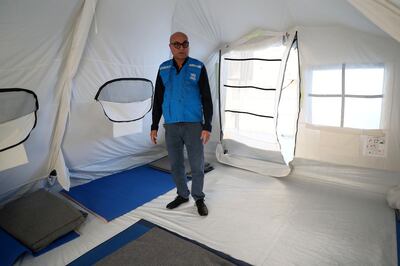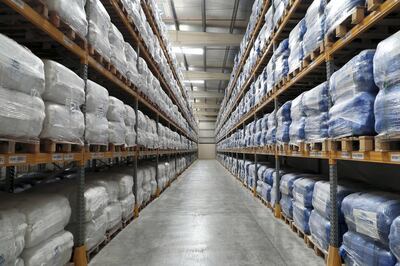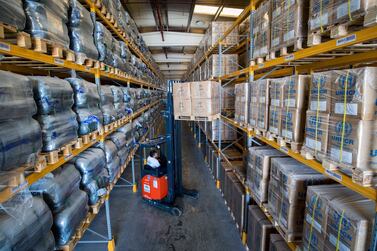Vital humanitarian aid is being delivered from Dubai to the world - to help a growing number of crisis-hit refugees caught up in conflict and disaster.
A massive stockpile of essential support is stored in 15 sprawling warehouses in the emirate, ready and waiting to be distributed to 250,000 people in need "at any given moment".
The emergency facility is operated by the United Nations Refugee Agency (UNHCR), an organisation tasked with protecting the rights of the world's most vulnerable people.
Spread across 14,000 square-metres, the relief hub, which opened in 2006, was donated to the agency by the UAE government.
"We store enough relief items adequate for 250,000 beneficiaries at any given moment," Muhammad Yaqoob, senior global supply officer, told The National.
“Blankets, both high thermal and medium thermal, are the most in demand items.
“Many get sent to refugee camps in the Middle East where temperatures can take a severe dip in the winter months.”

During a recent visit to the warehouse complex in International Humanitarian City, a digital screen logged the unit’s full capacity.
Pallets stacked 10 high contained 292,800 blankets , 47,700 buckets, 10,300 tents and 246,000 sleeping mats, among other items.
“If a call comes in, we aim to respond with 72 hours maximum,” Mr Yaqoob said.
“Our team works round-the-clock to make sure stocks are constantly replenished otherwise our response rates would suffer. It is something we cannot compromise on.”
As conflict continues around the world and climate change causes extreme weather conditions, we are now witnessing the highest levels of human displacement on record.
Globally, 70 million people have been forced from home, according to the latest United Nations figures.
Those stark figures make the role played in Dubai even more important.
In 2019, the Dubai warehouse sent out 138 containers carrying more than $6.8 million (Dh25million) worth of aid to 12 countries.
Eight chartered flights set off from the city, as well as 12 sea freights and one via a truck.
The full stockpile consisted of 10 separate items including containers, water buckets, tents and kitchen sets. However, blankets, mosquito nets and sleeping mats made up the majority of the aid sent out during the 12-month period.
“Last year we sent a lot of relief to Mozambique and Kenya following dreadful flooding in the countries,” said Mr Yaqoob.
“In Kenya, one refugee camp was so badly water-damaged that we had to relocate it to a different area."
While the agency predominantly responds to emergency crises caused by conflict, in the past few years, he said emergencies brought on by natural disasters have increased.
“Refugees are being affected by the climate crisis, no doubt.”
In late 2019, heavy rains devastated much of Kenya. One of the hardest hit areas was Garissa County, in the country's north-east. Relief was sent from the UNHCR Dubai to some of the most vulnerable communities, including refugees living in the Dadaab refugee camp.
In October, unprecedented flooding in South Sudan’s Maban County also affected nearly 200,000 people, including refugees and the host population.

At that time, the agency pre-positioned emergency shelter kits and material assistance to help more than 5,000 affected families to rebuild and repair damaged shelter.
Over the past eight years, the UNHCR Dubai team has responded to a total of 193 operations across the globe. It has sent out more than 10,600 containers and trucks loaded with relief items.
And one item in high demand by long-term refugee camps is the tent.
Shelter is a vital survival mechanism in times of crisis or displacement and is also key to restoring personal security, self-sufficiency and dignity, Mr Yaqoob said.
A core part of the agency’s protection mission is to guarantee access to adequate shelter in humanitarian emergencies.
“We provide tents, distribute plastic sheeting and give families basic tools to run as normal a life as possible. Plates, cups, cutlery,” he said.
Just recently, the agency developed two additional family tents which are currently under review and on display in the Dubai warehouse.
“We are still carrying out checks on the temperature control within the new tents but we hope to start distributing them soon,” Mr Yaqoob said.
“They are self-standing, so a lot easier to set up, and the material is more durable.
“They can fit a family of five, measure 14.5 square metres and come with all the essentials including solar lamps, sleeping mats and mosquito nets.”
To continue providing emergency assistance to those most in need around the world, Mr Yaqoob said facilities like that in Dubai need to continue to thrive.
“There have been countless studies that show how strategic emergency stockpiles save lives.
“Waiting five to six weeks for procurement and delivery from suppliers just isn’t acceptable for an agency like ours.”
In total, the combined response capacity from UNHCR’s seven global hubs in Denmark, Jordan, Ghana, Cameroon, Uganda, Kenya and the UAE, is 600,000 beneficiaries.
But as conflicts continue and climate change takes hold, global stockpiles are needed now more than ever, he said.






